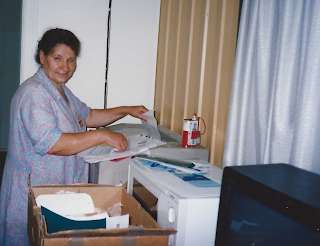 |
| U.S. Embassy, Chișinau, Moldova |
Russian had been the language of business, the language of eduction, the language of influence throughout the Soviet era. Most people in cities spoke Russian; few spoke Romanian. The Soviets had sent Russians into the cities to take up positions in the government and business sector. Most of the people on the collective farms spoke Romanian which tended to type cast Romanian speakers as peasants. There were some schools where instruction was given in Romanian, but anyone who wanted to get ahead went to schools where the language of instruction was Russian.
Even prior to gaining independence, the government of Moldova had declared Moldovan, not Russian, to be the official language of the republic. All the street signs in Chișinau had been replaced with ones in Moldovan, spelling out the names using the latin alphabet in place of Cyrillic. In the past, signs may have been in both Russian and Moldovan, such as this pair of spellings of Chișinau:
- Кишинёв (Russian)
- Кишинау (Moldovan)
 |
| Local staff from U.S. embassy, Chișinau, Moldova |
David and his wife Susan had been among the first group to travel to Moldova to set up the embassy, in the early days where everyone was on temporary duty. While they arrived on assignment just a few weeks before I did, they had much more experience and shared the history of setting up the embassy with us. From stories David told, I understood the first group of translators were very different from the crew on board when I arrived. David explained that the first group had too many bad habits such as their belief that the U.S. embassy would be just like every other employer they had had - the employers pretended to pay them so they only pretended to work. The American staff spent too much time trying to find out where the Moldovans were for any work to get done. The university students hadn't worked for anyone yet, so their work habits were untarnished by Soviet expectations.
Within a few weeks of my arrival, we received model position descriptions for the different types of work typically done by local employees which the nine translators looked over to decide which one looked like it would best suit their interests. Ludmilla became the consular assistant, Alexander, the financial assistant, Vlad*, the personnel assistant, Maria*, the political assistant, Irina*, the economic assistant, Stefan, the public affairs assistant, Natalya, the administrative secretary, Slava, the general services assistant, and Eva*, the ambassador's translator. Alexander, Natalya, and Eva spoke Russian, English, and Romania, although only Eva's position description required all three languages. The others spoke Russian and English.
 |
| One of the cooks at the embassy |
Once the regional security officer had completed vetting the local staff candidates, we hired them. Until then, the drivers, translators, and custodial staff had been paid on an hourly basis at the end of each week based on David's spreadsheet that recorded who had been on duty on which days. Once hired, they had to adjust to recording their own hours worked and begin paid every two weeks. The initial salary scale authorized was based on the salaries in Moscow, but we didn't implement that full scale as it was considerably higher than what anyone else in the country was paid. One of the two women who cooked for us, for example, was married to a Moldovan employee of the Ministry of Foreign Affairs and she earned more as one of the lowest graded employees at the embassy than her husband did.
Because the breakup of the former Soviet Union resulted in 14 new embassies being established at the same time, all of them hiring staff who had no previous experience working for Americans or in a diplomatic environment, the Department set up a training program for each of the functions and we sent our employees one at a time to Frankfurt or Bonn for one to three weeks of training. Initially the Department thought they would only need to provide that training once, that at the end of the training all embassies in the former Soviet Union would then have fully trained staff so that the training would not have to be repeated. But each of the new embassies was limited to hiring only 20 local employees -- from custodial and motor pool staff to the political and economic analysts -- and that meant there was only one person doing most functions. When a local employee was inevitably lured away from the embassy by another western organization getting set up in Moldova, there was no one else who knew the job or could move right into the vacancy. In the end, training for local staff became a continuing program and was expanded to local staff at all U.S. embassies, a legacy of those early days in the former Soviet Union.
*A name, not necessarily the right one.
No comments:
Post a Comment